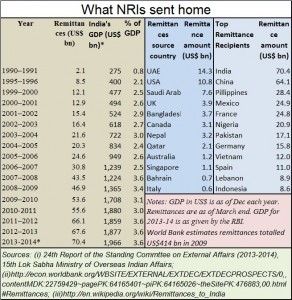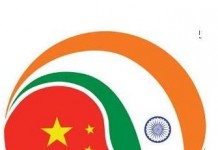Falling oil prices, remittances and jobs
Feb 04, 2016 12:00 am
http://www.freepressjournal.in/falling-oil-prices-remittances-and-jobs-rn-bhaskar/771956
Any which way you look at it, non-resident-Indians (NRIs) have done this country proud. With hardly any government support programme, through sheer grit and enterprise, these NRIs have ventured forth into alien lands and eked out a living.
They are the plumbers, masons, fitters, cleaners, electricians, engineers, clerks, managers and accountants. The spectrum is vast. At the top of the pyramid come the contractors, lawyers, investment managers and the entrepreneurs. The World Bank estimates remittances totalled US$414 billion in 2009, of which US$316 billion went from 192 million migrant workers to developing countries
 But look at remittances another way. They are nothing else but manpower exports. India has abundance of manpower. If this can be exported meaningfully, why not? Eventually, like any other export, they bring in precious foreign exchange, and give India a tremendous advantage globally. NRIs have made India the prime remittance receiver in the world (see chart).
But look at remittances another way. They are nothing else but manpower exports. India has abundance of manpower. If this can be exported meaningfully, why not? Eventually, like any other export, they bring in precious foreign exchange, and give India a tremendous advantage globally. NRIs have made India the prime remittance receiver in the world (see chart).
But there is agony ahead. Many may lose their jobs and get displaced. Falling oil prices (http://www.freepressjournal.in/oil-to-pressurise-remittances-into-india-r-n-bhaskar/767163) have caused the revenues of their host countries to shrink. That in turn is compelling them to cut back on expenditure. Coupled with a secular fall in prices of all commodities, this will mean job cuts. And it won’t be in the Middle-East alone, even though this region is the biggest contributor to India’s remittances. It will be exploration and mining companies worldwide. Australia, Brazil and Canada are also bleeding. All have begun cutting jobs. That will mean less work for accountants and lawyers as well, besides a host of other professions.
So what can the government do? There are three things it could do – almost immediately.
First, focus on skilling tens of thousands of Indians in areas where there could be tremendous demand for the next 20 years or so. True, the Modi government has been crying itself hoarse about skilling India. The previous government set up the National Skill Development Corporation, which was supposed to do this job. But both are doing things the wrong way. They have been trying to promote thousands of would-be skill developers without a standard certification in place.
A standard reliable certification helps. It allows people to know which person has the required skillset. Too many certification standards confuse a market. It does not know whether to depend on certificate A or B. Invalidating certain certificates would not help either. It would invite charges of favouritism.
Instead, the government should invite the best brands in each segment – say a Larsen & Toubro (L&T) in construction and engineering – to certify candidates. Provide it with skill development funds to vet the standards of each student passing out of various vocational institutes, and let the company grade them into various categories depending on their skill proficiency at various levels.
When an L&T certifies a skill, it ensures that the student is marketable not only in India, but also anywhere in the world. Since its brand will be linked to a workman’s capabilities, it will ensure that the brand does not get corrupted. It will be more ruthless in its evaluation of student-trainees than many of India’s educational institutes have cared to.
More importantly, an L&T has the ability to scale up this training – at reasonable costs — to produce tens of thousands of such people every year. It can build a centralized database of skilled people which could be accessed by consumers and contractors alike. The latter could then outbid any other contractor for construction projects anywhere in the world. If you have certifiable skills in large numbers and a willing workforce, this should not be difficult.
Just look at the Phillippines – with less than one-tenth India’s population, it is already the third largest recipient ($28.4 biullion) in the world.
Then do the same for other skills – maybe with Cisco for networking, or with Samsung for mobile phone repairs. And remember, we are not talking about engineers who have to decide whether to opt for a Cisco or a TP-Link router, but with technicians who know how to set up certain parameters. That would be the shortest and most effective way of skilling India in plumbing, road repairs, masonry, carpentry, electrical wiring, welding and other such skills. The money meant for skill development would then get used up more effectively. You would also have a databse of skills, which could be contacted should a need arise.
But what would India do if these skilled people do not get jobs? That is where the second job of the government kicks in. It should, in partnership with industry leaders, identify countries where large projects are available. Take war-torn areas like Afghanistan, Syria, Iraq and Libya. Negotiate with the authorities in charge of reconstruction. Work out ways which would ensure that large bits of such projects go to Indian contractors.
Third, work out deals with the most richly endowed countries like Russia for Indians to exploit their gold mines. Russia is huge, with one of the lowest population densities in the world (http://asiaconverge.com/2014/06/russia-india-china-is-the-magic-formula/). It needs people. It could do with the money from gold. And it is strategically important for India. This way both Russia and India benefit.
Unless the government moves quickly to work on all the three measures, expect the loss of jobs in mining and exploration countries to haunt Indian policy-makers. That could become an economic, social and political nightmare for the Modi government.







































COMMENTS